By Audrey Anderson
Hometown Weekly Reporter
A community discussion was organized as a joint effort of Pilgrim Church, Sherborn Library, Dover Town Library, Dover Church and Project Challenge Success at DSHS. According to Senior Pastor John Hudson of Pilgrim Church, the meeting was “a public forum on the book “The Anxious Generation: How the Great Rewiring of Childhood Is Causing an Epidemic of Mental Illness” by Jonathan Haidt . . . the forum is a time to gather and share concerns and challenges facing children, youth, parents, and other caregivers around issues of screens and screen time.”
A panel of experts answered questions posed by Pastor Hudson about their reactions to various themes explored in the book. The panelists included Kate Potter, a former schoolteacher and school board member, who is also a parent; Mary Ellen Crowley, a clinical psychologist who teaches at McLean Hospital and Harvard Medical School; and Stacey Creamer, a psychologist who directs the Behavioral Health Department at Northeastern University and also maintains a private practice.
Sherborn Library Director, Liz Anderson, started out the discussion by thanking sponsors, including the Sherborn Business Association, Pilgrim Church, the Friends of the Sherborn Library, and the Aesop’s Fable bookstore in Holliston, which ordered and sold enough copies of the book to get the towns reading.
Pastor Hudson opened the topic by relating a story about a church youth group trip to a work camp. Hudson was looking forward to a car ride filled with trivia games and discussions. Instead, the kids were on their phones during the whole trip to the camp and back home. Hudson then asked the panelists to introduce themselves and speak about their personal experiences with the topic.
Potter reviewed the existing policies in each of the schools in Sherborn. She said that phones must be in kids’ backpacks all day in elementary school and added that the middle school just started a new Yondr Pouch program in which kids put their devices in magnet-locked bags that are not released until the end of the school day. In the high school, students can bring their phones to school. They can’t turn them on unless a teacher invites them to. In some classrooms, students are asked to keep their cell phones in a “cell hotel” (or, a shoe pouch hanging over the door) until the end of the period, when they can use the phones between classes.
Crowley said she finds that kids are more anxious and depressed than they were before. When she encourages them to take a break from their phones, their “agitation goes away, and they feel free.”
Finally, Creamer added that “social distancing actually started in 2012, with the introduction of smart phones.” She finds that there is a correlation between self-worth and social media.
During the program, various topics were discussed, including the need for kids to build resilience and face-to-face social skills, how social media raises the anxiety of both girls and boys with body image issues, and how smart phones and other screen apps use the same tactics as casinos to keep kids--and adults--engaged for long periods of time.
In response to a question from audience member Toby Bentley, the panelists gave suggestions on how parents can model the behavior they want their kids to follow in keeping screen use limited in their lives and to find their own values and voices.
Many other nuances of the topic and reactions to the book were discussed. The event was recorded and will be available for viewing on the Internet in the future. Check with the Sherborn Library or Dover Town Library for more information.

























